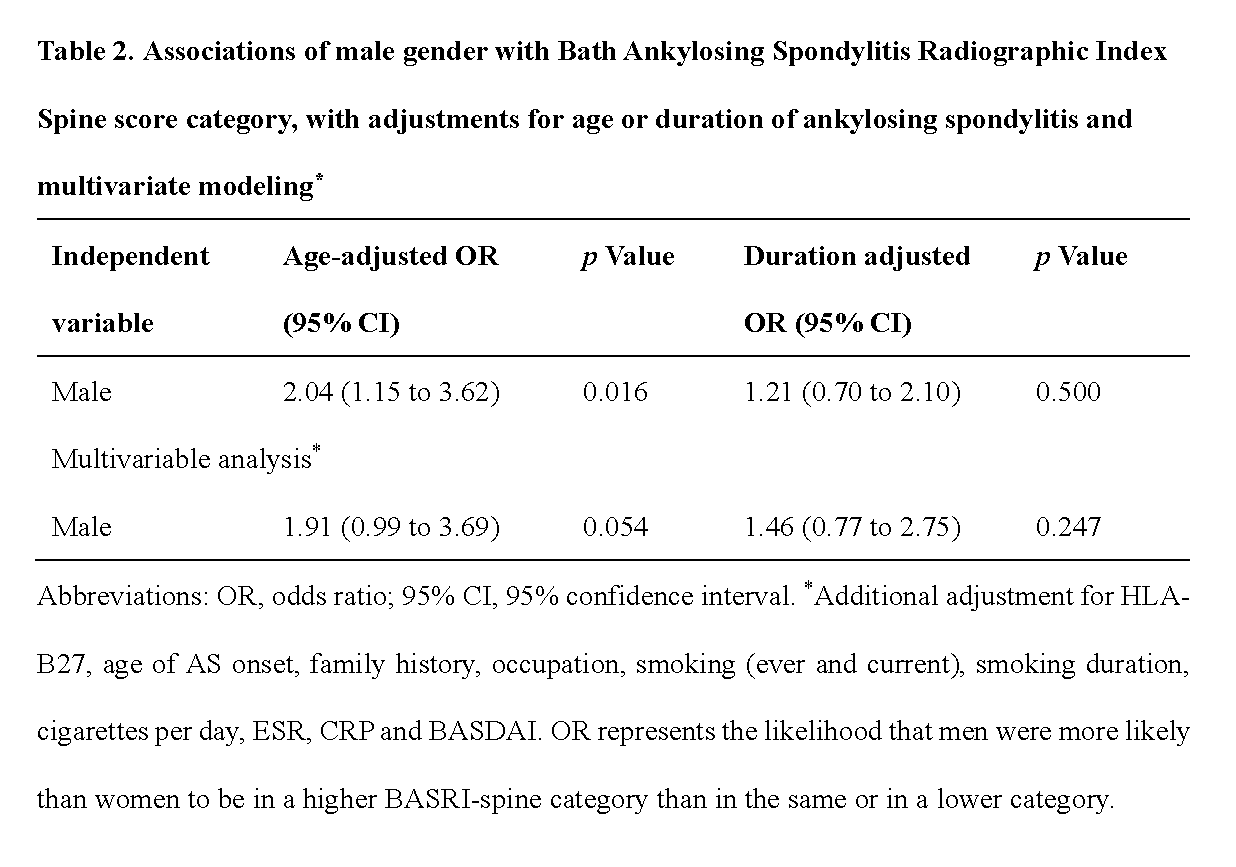Session Information
Date: Monday, October 22, 2018
Title: Spondyloarthritis Including Psoriatic Arthritis – Clinical Poster II: Clinical/Epidemiology Studies
Session Type: ACR Poster Session B
Session Time: 9:00AM-11:00AM
Background/Purpose: Growing evidence suggests gender-specific differences in the phenotypes of ankylosing spondylitis (AS). However, a literature search failed to reveal evidence of such differences in Chinese AS patients. We aimed to assess the gender-specific associations with disease patterns of Chinese AS patients.
Methods: This study included 223/60 male/female AS patients, and 98.6% were of Han descent. All AS patients fulfilled the modified New York criteria. Structural damage of sacroiliac (SI) joints, hip joints and spine were evaluated by computed tomography (CT) scans, lumbar and cervical X-ray, respectively. Structural damage of AS was assessed by mSASSS, BASRI-SI, BASRI-spine and BASRI-hip (modified) by a trained rheumatologist and musculoskeletal radiologist with high test inter-rater reliability (average kappa: 87.3%). The association of gender with BASRI-spine category, expressed as odds ratio (OR) and 95% confidence interval (95% CI), was calculated using ordinal logistic regression.
Results: Female AS patients were older than males (p=0.0003), and they also had older age of AS onset (p<0.0001), a lower frequency of HLA-B27 (p=0.018), a higher family history of reported AS in first-degree relatives (p=0.0025) than male patients. Both genders had similar disease duration. Mean levels of CRP (p<0.0001) and ASDAS-CRP (p=0.0284) were significantly higher in male patients than in female patients (Table 1). As previously reported, male AS patients from non-Chinese cohorts had more radiographic damage, more hip impact, worse function and higher diagnostic delays than female patients [PMID: 20357993, 17127685, 26385369]. However, in Chinese AS patients, no gender-associated diagnostic delays or functional impairment were observed. Structural damage severity was worse among male AS patients only at the SI joint, but not at lumbar or cervical spine and hip. After adjusting for age or disease duration and other risk factors (Table 2), no gender-specific association with categorized BASRI-spine was noted (OR=1.91 or 1.46, 95% CI: 0.99 to 3.69 or 0.77 to 2.75, p=0.054 or 0.247).
Conclusion: In a Chinese cohort, female AS patients were observed to have later age of disease onset, but similar severe spine and hip joint structure damage and limited function as male patients. Compared with other racial groups, Chinese female AS patients may have more severe disease and worse outcome.
To cite this abstract in AMA style:
Kong W, Jefferies C, Learch T, Gan X, Cui J, Xu Y, Jin D, Zhang Y, Wang J, Tao Q, Yan X, Weisman M, Ishimori M. Gender-Specific Differences in Chinese Patients with Ankylosing Spondylitis [abstract]. Arthritis Rheumatol. 2018; 70 (suppl 9). https://acrabstracts.org/abstract/gender-specific-differences-in-chinese-patients-with-ankylosing-spondylitis/. Accessed .« Back to 2018 ACR/ARHP Annual Meeting
ACR Meeting Abstracts - https://acrabstracts.org/abstract/gender-specific-differences-in-chinese-patients-with-ankylosing-spondylitis/


